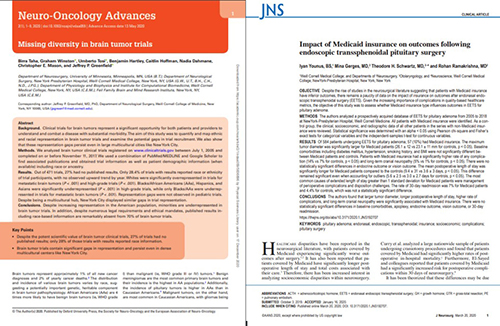Two journal articles published by Weill Cornell Medicine Neurological Surgery faculty this year demonstrate that we still have a long way to go to erase disparities in health care, even within neurosurgery. Although we provide every patient with the very best care we can, regardless of their economic status or ethnic identification, the disparities continue to exist. As these two studies suggest, by the time a patient arrives in our office their backgrounds have already influenced their prognoses.
First, Dr. Rohan Ramakrishna and Dr. Theodore Schwartz collaborated on a paper that examined patient outcomes after endonasal endoscopic transsphenoidal surgery (EETS) for pituitary adenoma between 2005 and 2018 at NewYork-Presbyterian/Weill Cornell Medical Center. The goal was to assess how outcomes varied based on whether a patient was covered by Medicaid; the finding was that outcomes are significantly worse. In Medicaid patients, tumors at the time of surgery were likely to be larger than those in non-Medicaid patients, suggesting that they’d been found and diagnosed later.
Researchers looked for other differences between the Medicaid patients and the control group and found that risk factors (diabetes mellitus, hypertension, a history of smoking, and BMI) were similar. Complications, however, were higher in the Medicaid patients; they included infection, pulmonary embolism, cranial neuropathy, vascular injury, CSF leak, hematoma, and readmission within 30 days. The size of the adenoma was the main difference, with Medicaid coverage the factor most closely associated with the larger size and the worse outcomes.
We know that early detection is a significant factor in outcomes in many types of neurosurgical condition – any tumor in the brain is cause for concern, but the level of concern and degree of severity grows predictably with the size. A larger tumor puts more pressure on the brain than a small one does, is harder to remove safely, and in some cases has time to shift from being benign to malignant. Patients who get regular checkups are more likely to report even small changes and minor symptoms to their doctor, which provides an opportunity for screening tests and diagnoses early on in a disease process. Medicaid patients as a group presented as surgical candidates with tumors that were not diagnosed until they were much larger.
The paper, “Impact of Medicaid insurance on outcomes following endoscopic transsphenoidal pituitary surgery,” was published online in advance of print in the Journal of Neurosurgery.
Dr. Jeffrey Greenfield and his team, which included Dr. Caitlin Hoffman, Dr. Nadia Dahmane, Dr. Chris Mason and resident Drs. Benjamin Hartley, Umberto Tosi, and Graham Winston) looked at 471 clinical trials for brain tumors over a 12-year period, from 2005 to 2017, to quantify ethnic and racial representation within the patient populations participating in trials. Researchers on this study were dismayed that, despite numerous legal requirements and ethical mandates, published results including race-based information were remarkably absent from 70% of brain tumor trials.
In the 97 trials that were published and that included ethnicity, whites were significantly overrepresented in adult trials for metastatic brain tumors and high-grade tumors (91% of enrolled patients). Blacks/African Americans, Hispanics, and Asians were significantly underrepresented in high-grade trials; only Blacks/African Americans were underrepresented in trials for metastatic brain tumors. The representation gaps exist even in large multicultural cities like New York. These gaps in recruitment show a missed opportunity for non-white patients to take advantage of these trials.
One bright spot in the results is that these representation gaps were not observed in pediatric trials. In trials involving children, whites represented only 67% of enrollees, Black children 9.5% (compared to only 2.8% in adult trials), Hispanic children 8.3% (versus 1.1% in adult trials), and Asian children 5.4% (versus 1.8% of adult trials).
The paper, “Missing diversity in brain tumor trials,” was published in Neuro-oncology Advances in May.


